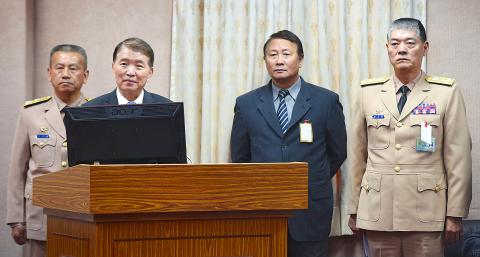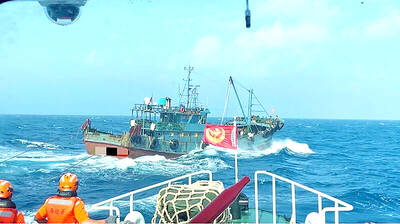Parents and politicians on Tuesday were infuriated when they found a government-sponsored educational Web site to promote national defense concepts showing a video of China’s People’s Liberation Army (PLA) on parade, along with about 40 World War II movies that were produced by the Chinese government.
The controversy also riled opposition legislators at the legislature’s Foreign Affairs and National Defense Committee meeting yesterday, who accused top military officials of negligence for helping Chinese propaganda materials reach Taiwanese.
The Web site that broadcast the videos is among the programs managed by the National Defense Education Center, a collaboration between the Ministry of National Defense and the Ministry of Education, and is based at Hsinchu Senior Girls’ High School in Hsinchu City.

Photo: Liu Hsin-de, Taipei Times
Democratic Progressive Party (DPP) Taichung City councilors Chen Shih-kai (陳世凱) and Hsieh Chih-chung (謝志忠) on Tuesday said it was egregious that the Ministry of Education is apparently unable to distinguish between our own military and enemy troops.
“If our students’ education on national defense has to depend on China to supply the materials, then our national security is in trouble,” Hsieh said.
Their sentiments were echoed by DPP Legislator Hsu Tain-tsair (許添財), who questioned Minister of National Defense Kao Kuang-chi (高廣圻) at the legislature over the matter.
“Our nation is facing a perilous situation with the threat of force from China. However, we are also facing real dangers of subversion from within, and cooperation with the enemy by Taiwanese who are bought off to work for China. This Web site is helping China to promote their military might and to destroy our national identity,” Hsu said.
He demanded that Kao and his military officials make a full investigation, since the Web site and the education center are part of a defense ministry program.
After the issue was raised on Tuesday, the Chinese video materials in question were removed, and officials at the education ministry promised to beef up the Web site’s internal monitoring and checks mechanism.
School principal Lu Shu-mei (呂淑美) said that the videos were uploaded by an assistant at the National Defense Education Center, which provides materials for teachers.
“Maybe the assistant believed those videos would help teachers to better understand China’s military threat against Taiwan, so she decided to put them online for viewing. We understand it could cause controversy, due to people’s different interpretations, so the videos have been taken off,” Lu said.
However, National Federation of Teachers Unions president Chang Hsu-cheng (張旭政) suspected a hidden agenda by the Ministry of Education.
“China’s military parade with PLA troops on display to mark victory over Japan in World War II demonstrated only China’s viewpoint. It is totally different from the Taiwanese historical view,” he said.
“We see the adjustment of the high-school curriculum guidelines was led by pro-China academics. So I suspect this is also the case — that a few officials’ political concepts and ideology now have full influence over the education ministry,” he said.

MILITARY BOOST: The procurement was planned after Washington recommended that Taiwan increase its stock of air defense missiles, a defense official said yesterday Taiwan is planning to order an additional four PAC-3 MSE systems and up to 500 missiles in response to an increasing number of missile sites on China’s east coast, a defense official said yesterday. The official, who spoke on condition of anonymity, said that the proposed order would be placed using the defense procurement special budget, adding that about NT$1 trillion (US$32,88 billion) has been allocated for the budget. The proposed acquisition would include launchers, missiles, and a lower tier air and missile defense radar system, they said The procurement was planned after the US military recommended that Taiwan increase

POLITICAL AGENDA: Beijing’s cross-strait Mid-Autumn Festival events are part of a ‘cultural united front’ aimed at promoting unification with Taiwan, academics said Local authorities in China have been inviting Taiwanese to participate in cross-strait Mid-Autumn Festival celebrations centered around ideals of “family and nation,” a move Taiwanese academics said politicizes the holiday to promote the idea of “one family” across the Taiwan Strait. Sources said that China’s Fujian Provincial Government is organizing about 20 cross-strait-themed events in cities including Quanzhou, Nanping, Sanming and Zhangzhou. In Zhangzhou, a festival scheduled for Wednesday is to showcase Minnan-language songs and budaixi (布袋戲) glove puppetry to highlight cultural similarities between Taiwan and the region. Elsewhere, Jiangsu Province is hosting more than 10 similar celebrations in Taizhou, Changzhou, Suzhou,

COGNITIVE WARFARE: Chinese fishing boats transmitting fake identification signals are meant to test Taiwan’s responses to different kinds of perceived incursions, a report said Chinese vessels are transmitting fake signals in Taiwan’s waters as a form of cognitive warfare, testing Taipei’s responses to various types of incursions, a report by the Institute for the Study of War said on Friday. Several Chinese fishing vessels transmitted fake automatic identification system (AIS) signals in Taiwan’s waters last month, with one mimicking a Russian warship and another impersonating a Chinese law enforcement vessel, the report said. Citing data from Starboard Maritime Intelligence, the report said that throughout August and last month, the Chinese fishing boat Minshiyu 06718 (閩獅漁06718) sailed through the Taiwan Strait while intermittently transmitting its own AIS

CHINESE INFILTRATION: Medical logistics is a lifeline during wartime and the reported CCP links of a major logistics company present a national security threat, an expert said The government would bolster its security check system to prevent China from infiltrating the nation’s medical cold chain, a national security official said yesterday. The official, who wished to stay anonymous, made the remarks after the Chinese-language magazine Mirror Media (鏡周刊) reported that Pharma Logistics (嘉里醫藥物流) is in charge of the medical logistics of about half of the nation’s major hospitals, including National Taiwan University Hospital and Taipei Veterans General Hospital. The company’s parent, Kerry TJ Logistics Co (嘉里大榮物流), is associated with the National Committee of the Chinese People’s Political Consultative Conference (CPPCC) and the Chinese People’s Liberation Army (PLA), the